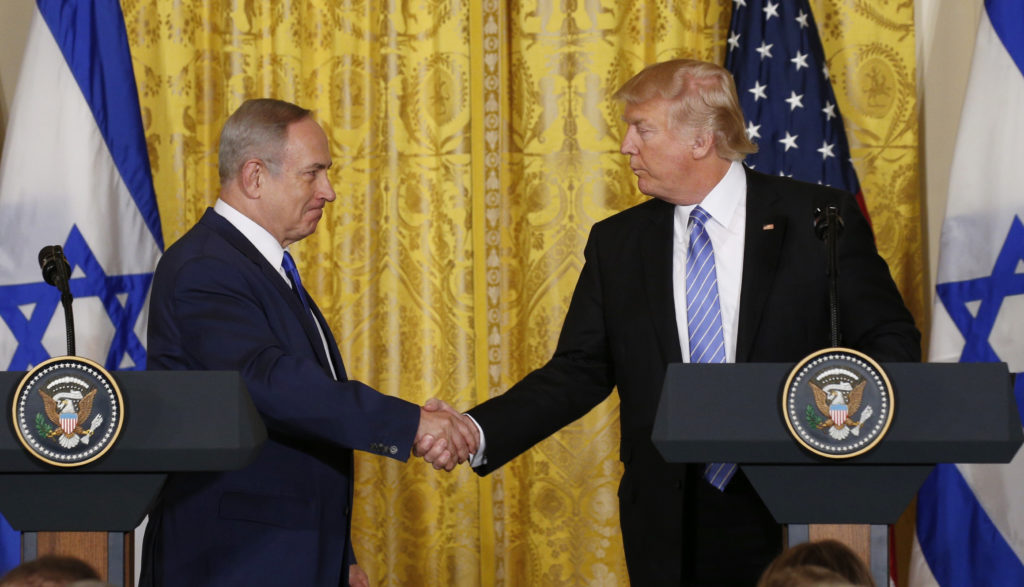
U.S. President Donald Trump (R) greets Israeli Prime Minister Benjamin Netanyahu after a joint news conference at the White House in Washington, U.S., February 15, 2017. REUTERS/Kevin Lamarque – RTSYTYU
This submission was written by Shahar Golan, a member of the Foreign Policy Association’s Great Decisions team, and an occasional blog contributor.
President Trump’s announcement last Wednesday recognizing Jerusalem as Israel’s capital was labeled “a new and genuine milestone in the glorious history of this city [Jerusalem]” by Israeli Prime Minister Benjamin Netanyahu.
In a video posted to his social media account, Netanyahu was uncharacteristically upbeat as he triumphantly told the Israeli people that Trump’s Declaration will go down in Zionist history as an event on par with the Balfour Declaration, Israel’s Declaration of Independence, and the victory in 1967.
Netanyahu has good reason to celebrate the declaration. At least for now, it is a substantial victory, diverting attention from investigations into his alleged corruption and bolstering his political message.
In recent months allegations of corruption have been closing in on Bibi, his family, and senior members of his party, often dominating Israeli news.
Just days prior to Trump’s announcement tens of thousands took to the streets of Tel-Aviv to protest government corruption. They were ignited by a recent push by members of the ruling party to pass an anti-democratic law changing the judicial process in favor of the prime minister. The law was to the Israeli news cycle what Michael Flynn was to the American press.
Then came Trump, diverting attention to the holy city.
With Jerusalem in the headlines, the main opposition figures from the centrist and center-left parties have been unable to attack Netanyahu, and have de-facto praised his diplomatic achievement.
Notably the new head of Labor Party, Avi Gabbay, who is in the midst of a veer to appeal to soft-right voters, echoed Bibi’s triumphalism, declaring that “a united Jerusalem is even more important than peace”.
But diverting public attention from his investigations is not the only win Bibi scored from the declaration. The recognition of Jerusalem as Israel’s capital bolsters Netanyahu’s argument that he can continue the status-quo in the occupied territories, and avoid substantial diplomatic blowback.
Netanyahu isn’t in the business of selling euphoric ideas to the Israeli public. “I’m asked if we will forever live by the sword – yes” Netanyahu told members of Knesset in 2015. If you remove his periodic rhetorical sugarcoating on the Palestinian issue, Netanyahu’s message boils down to the belief that there is no solution to the conflict. In other words, Israelis will always have to deal with security threats, and live by their sword.
The crucial part of Netanyahu’s message, which he has sold enough Israelis on to become the 2nd longest serving Prime Minister, is that even though Israel’s security situation isn’t perfect, if you elect anyone but him, things will turn apocalyptic.
His opponents left of the political center have attempted to attack Bibi by claiming that his unwillingness to seriously engage with the Palestinians is leading Israel to international isolation. They warn that he will turn Israel into a pariah state, that at any moment his government’s actions may unleash a ‘political tsunami’ or a ‘diplomatic intifada’.
Netanyahu’s response has painted his opponents as weak and over-willing to bend to international pressure. He assures the public that he will reject the supposedly dangerous concessions to the Palestinians his political opponents advocate. Simultaneously avoiding the political tsunamis they warn about. In a nutshell, he has argued that he can, in due time, convince the world to accept his positions. Improving Israel’s standing in the global community, while the prospect of Palestinian statehood fades from the international agenda.
Aluf Benn, the editor in chief of the liberal daily Haaretz, has been meticulously analyzing Netanyahu’s world view. The title of his article from last July “Netanyahu’s Message to the World: Accept Israel as It Is, Occupier and Settler” succinctly sums up Benn’s take. Last week he pulled on similar threads when he wrote that “U.S. President Donald Trump’s recognition of Jerusalem was a gift for Prime Minister Benjamin Netanyahu in his real fight – the one against Palestinian nationalism”.
Trump’s announcement is just the latest evidence Netanyahu can point to, as he convinces Israelis that with him navigating the international system they can have it all. It helps Bibi argue that he can maintain a far-right messianic settler religious coalition that has no intention of creating a Palestinian state, without having to pay a meaningful diplomatic price for it.
Bibi’s argument is solidifying. The fraught relations with former president Barack Obama are, for now, a bygone era. President Trump visited Israel on his first foreign trip and the two leaders appear to have fantastic personal relations. Last July, Narendra Modi became the first Indian Prime Minister to visit, and commercial ties with Asia and Africa are improving.
To top it off, due to geopolitical shifts and alignment of interests, relations with Saudi Arabia and Egypt are better than ever. Notably, the tighter cooperation with the most influential and most populous Arab countries has not been accompanied by any genuine effort to solve the conflict with the Palestinians.
Trump’s announcement reversing 70 years of US policy and recognizing Jerusalem as Israel’s capital is another symbolic win for Netanyahu. The declaration will help Bibi convince Israelis that he can do it all. Continue the occupation, and maintain strong international standing.
—
Shahar Golan is a native Israeli and former Seattlite currently living in Brooklyn and working on the production of Great Decisions. Previously he was an Americorps volunteer at a high-needs middle school, and worked in International Development in rural Myanmar. He earned a bachelors in International Studies from the University of Washington, and is a life long soccer fan.